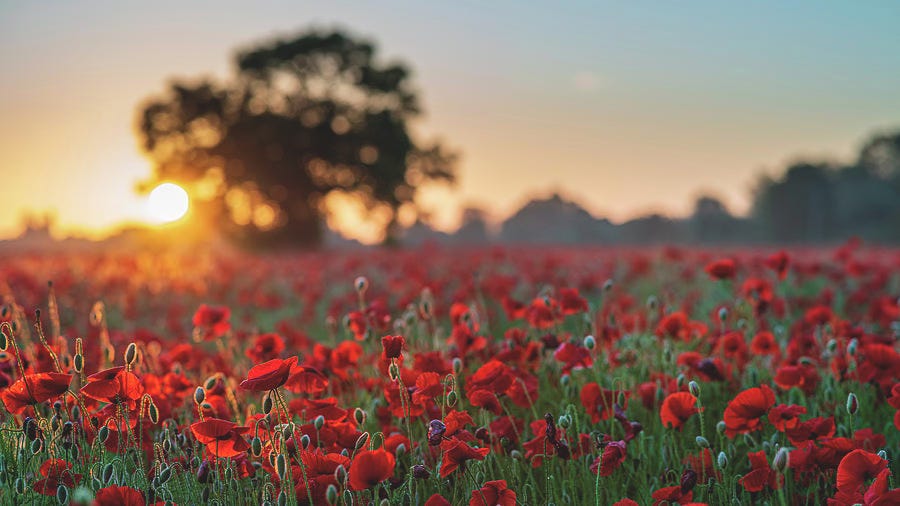Emerging from the dark and foreboding forest, the jongleur made his way to a stunning glade adorned with a vibrant array of wild flowers. Over five hundred peasants had gathered around red flags with a palpable spirit of resistance. Those humble folks, known to the Parisians as Jacques Goodfellow, bore the weight of displacement caused by the harsh trials of war, plague, and famine. And their revolt was somewhat a consequence.
At twilight, beneath the ominous shadow of the storm-ravaged castle, a scene of macabre celebration unfurled. The Jacques with their spoils dripping with the scent of battle—weapons still gleaming, stolen finery draped over blood-stained garments—gathered around roaring bonfires with a frenzied fervor.
Amidst the flickering light, the jongleur Henri Guiot beheld a scene that teetered on the edge of the surreal—a defiant carnival in full swing. Each peasant was clad in elaborate, grotesque disguises, a chaotic blend of fabrics and forms. The atmosphere crackled with tension, yet the revelers abandoned themselves to wild celebration. Crimson cloaks billowed like victory banners, embroidered hose and plundered regal garments gleamed, all taken from the castle’s coffers. This chaotic array of costumes formed a vibrant, jarring tapestry of colors and textures, symbolizing their rebellious conquest.
That was a unique way of stripping away inhibitions, the jongleur noted, reminiscent of what he had witnessed in Paris. There, he was genuinely shocked by the scandalous orgiastic displays of the goliards with their bawdy drinking songs. Yet, he found the peasants’ simplicity to be almost magical, akin to an abracadabra-like charm.
The jongleur was welcomed like an entertainer as he advanced with the jingle of his colorful attire, children and women approached him to celebrate his arrival with cheers and the clamor reserved only for kings; the peasants considered him a distinguished guest and ensured he was fed and had something to drink.
Henri Guiot’s stomach was shrunken from the hunger he had endured in the forests, and he accepted only a sip from a jug, a slice of roast meat, always so moderate and respectful, returning the exaggerated bows of the peasants who badly imitated the courtiers of a castle and then touched his small bells with devotion, as if he were indeed a holy man.
A young woman offered him a gittern to play, something he did gladly after tuning the strings, starting with a festive melody. When he finished the piece, Henri wanted to return the stringed instrument, but the young woman insisted that he take it as a gift. She could not play the gittern but she could sing instead.
“Would you like to convene to rehearse an aubade song?”, she asked.
“Why not? But I guess you should tell me your name first, if you don’t mind.”
He made her blush for being interested in her name when anonymity was a customary precaution.
“My name is Azalaïs, like my grandma, a trobairitz from Porcairagues.”
She told him that her grandma’s songs were still sung during that time of revolts, even though those were old love songs, an unthinkable emotion in the middle of such cruelty. Her family had hurried from Occitania fleeing from the ravages of the bubonic plague, losing everything in the process, and getting stuck working the land in Compiègne for a feudal master until her parents and brothers were killed in a brutal English raid. Since then, like a bird in a storm, she wandered aimlessly until she joined the peasant's revolt, living day by day.
“And yes–Azalaïs said with raging pride looking him in the eye–I slit the throat of a rich old man for the first time in my life with a sharp big knife, like everybody else, when we stormed into the castle this early morning.”
But she tried not to dwell on that. She felt lucky to be alive because it could be otherwise if that castle had been protected by loyal knights. But it wasn’t. And all she wanted then was to sing to all the shadows that engulfed her life so soon. Indeed, Azalaïs didn’t expect to live to see another spring like that one.
“I hope that we would face an army of knights later rather than sooner, and that would be the end of the revolt and probably my life. Because I don’t want to live again under the yoke of a master.”
To Henri that confession sounded like the remorse of a child. Of course, she had been disturbed after her first killing. The jongleur was incapable of committing a crime, but after hearing her story, a very common one those days, he asked himself if he could kill in cold blood like she did.
When you lose everything, you lose your humanity as well. That was what all those people shared, a sense of impending doom and certain demise. They knew at some point they were going to be hunted like rabbits, hence it made no sense to pass judgment. They already assumed their fate and accepted it. All of them.
So, Henri began to tune the gittern and smiled at Azalaïs when he was ready. She began to sing with a golden voice that he certainly could use in the unlikely event she left the revolt. What kind of life could he offer her? What would be tempting? A walk with Love and Death? And then what? She would be probably raped a hundred times by flayers or mercenaries that roamed the woodlands before reaching the sea. He couldn’t fall in love with her. Maybe in the next life they they could have a chance.
As the flames of the bonfire danced in the dark night, the frenzied atmosphere was filled with a sense of thrill. The mesmerizing song of Azalaïs provided a moment of solace for the Jacques, turning their hearts from fear to longing.
The lyrics were an aubade song, Before the Cold Winter Comes–the time of frost, snow, and mud–evoking the bittersweet emotions of lovers bidding farewell with the promise of a future reunion to rekindle their passion. And a petition to the jongleur of cheerful heart. Take my song far away!
In the dim light of the bonfire, he plucked the gittern, blending it seamlessly with her soulful singing. Her voice painted over a vivid picture of the dawn, drawing his audience to the brink of their deepest emotions. The hushed stillness that enveloped the listeners hinted at the profound sorrow and heartache hidden within their own personal goodbyes.
Gathered around the flickering fire, a diverse group of people, more strangers who’d been randomly thrown together than kin, leaned on each other spellbound by the enchanting music emanating from Azalaïs and Henri. They were not merely performers, but a humble conduit for the poignant melodies weaving around the night air.
The peasants yearned to draw closer to them, to share in their world, to feel the warmth of camaraderie as palpable as the flickering flames that danced alongside their enchanting melody. The aubade song wove through the early morning air with a hypnotic grace, its notes like tendrils of mist that wrapped around the hearts of those who listened.
They stood entranced, souls swaying to the music’s ebb and flow. Beyond mere notes, it was a passage through buried emotions and uncharted dreams. Each refrain sketched distant lands and whispered untold tales, stirring a restless longing to roam hither, thither, and yon. Like a tender breeze through fields of poppies, the melody beckoned them to chase elusive echoes, to follow where heartstrings led, in search of the lover’s embrace.
As the melody unfolded, its allure grew stronger, pulling at the very fabric of their existence. They yearned to step into its embrace, to dance amidst its intricate rhythms, to lose themselves in its timeless melody. But the casual pair who conjured this ethereal symphony remained as enigmatic as the dawn itself, elusive and free-spirited.
The peasants quivering with a blend of awe and reverence, bewildered and entranced, they found themselves suspended in a reverie, like fragile links in a chain on the verge of snapping.
And so they lingered, caught in the spell of that mesmerizing aubade song, so wondrous and deep, with their souls resonating with its haunting echoes.














Share this post